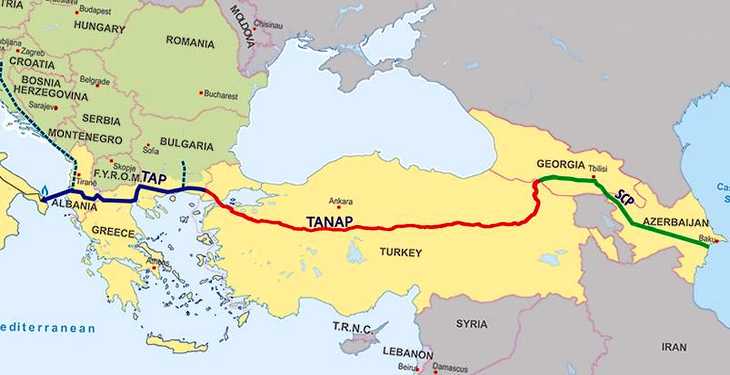 Emily Olson
Emily Olson
Vice-President of Communications and External Affairs for BP’s Southern Corridor
an interview by Alice Sapcaliu, GBC
The Southern Gas Corridor project is a strategic project for Europe, transporting the Shah Deniz gas to Western Europe. Could you please share with us the current stage of the project and what are the objectives for short and long run?
For the Southern Gas Corridor, the most important thing to recognise today is that this project is well underway in all six countries: Azerbaidjan, Georgia, Turkey, Greece, Albania and Italy. The offshore campaign and the Caspian SCP-EX, TANAP and TAP are all under development and coming together as well, which is an incredible milestone for a project of this size.
So what we really focus on is making sure that people understand this is a real project, not a “pipe dream”. Between Azerbaidjan and Georgia there are 27,000 people working on the project and this section is approximately 80% complete. In TANAP there are over 6,000 people working in Turkey. Greece has also started construction and the Albanian section has been underway for more than a year now. TAP is even doing some early construction work in Italy.
Not only is the pipeline construction well underway, but the gas it will carry has already been sold. We have 11 gas buyers, and underpinned by long-term gas sales agreements.
In the short term, our objectives are to keep working safely and on schedule. To date, we have worked more than 20 million man-hours on this project with excellent safety performance.
First gas will come to Turkey in Eskişehir in 2018 followed by gas to Europe in 2020.
What are the key challenges in cross-border projects from your perspective?
Any project of this size will always have its challenges, be it technical, non-technical, political or cultural. With cross-border projects, it is imperative the governments support the development of this project. Azerbaidjan, Georgia, Turkey, Greece, Albania, Italy are very supportive and this opens the door to a much more open and transparent dialogue across the countries. We want to make sure that we are working in partnership with the governments to make sure that the communities are being looked after, that we are meeting the requirements of the governments and doing our best to leave a good mark in the communities where we are operating.
On the technical side of the Shah Deniz project we are drilling 26 wells in the Caspian. We are building two new bridge-linked offshore platforms and 500 kilometres of subsea infrastructure which will link the wells with the onshore terminal. We are also expanding the Sangachal Terminal in Azerbaidjan.
The Southern Gas Corridor will play a very important role for the geopolitics of the region. In your opinion, how should the countries involved in the project capitalise on the opportunity to become regional gas hubs?
The Southern Gas Corridor and Shah Deniz will provide 16 bcma of gas. Six bcma of gas will go to Turkey, 1 bcma of gas has been sold to Greece, 1 bcma of gas has been sold to Bulgaria and 8 bcma have been sold into Italy.
This creates a great opportunity for South Eastern Europe to invest in the interconnectivity between the countries. The Southern Gas Corridor will be the catalyst to many interconnector projects.
Interconnectors are part of the strategic intent of this project and will open up the markets in the region.
We are looking forward to welcoming you at the 4th Black Sea Oil and Gas Conference. Could you please let us know what your expectations for the upcoming conference are?
It is always helpful to hear from others how they see the development of the gas markets in Europe as well as views from different companies and governments.

 Emily Olson
Emily Olson